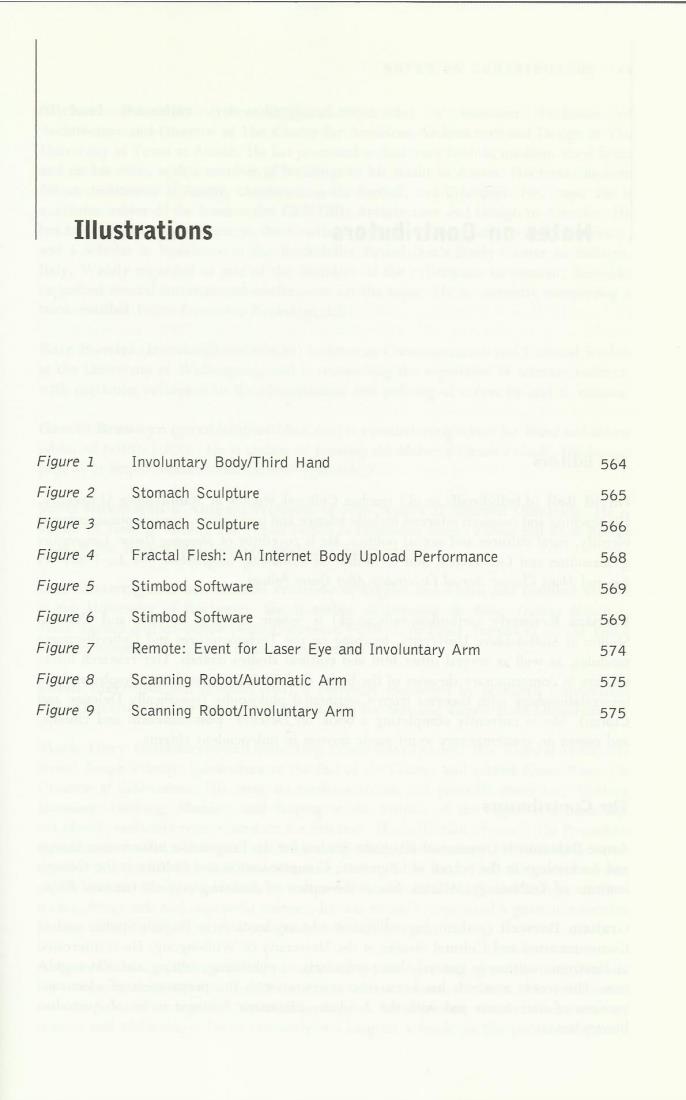
Illustrations Figure 1 Involuntary Body/Third Hand 564 Figure 2 Stomach Sculpture 565 Figure 3 Stomach Sculpture 566 Figure 4 Fractal Flesh:An Internet Body Upload Performance 568 Figure 5 Stimbod Software 569 Figure 6 Stimbod Software 569 Figure 7 Remote:Event for Laser Eye and Involuntary Arm 574 Figure 8 Scanning Robot/Automatic Arm 575 Figure 9 Scanning Robot/Involuntary Arm 575
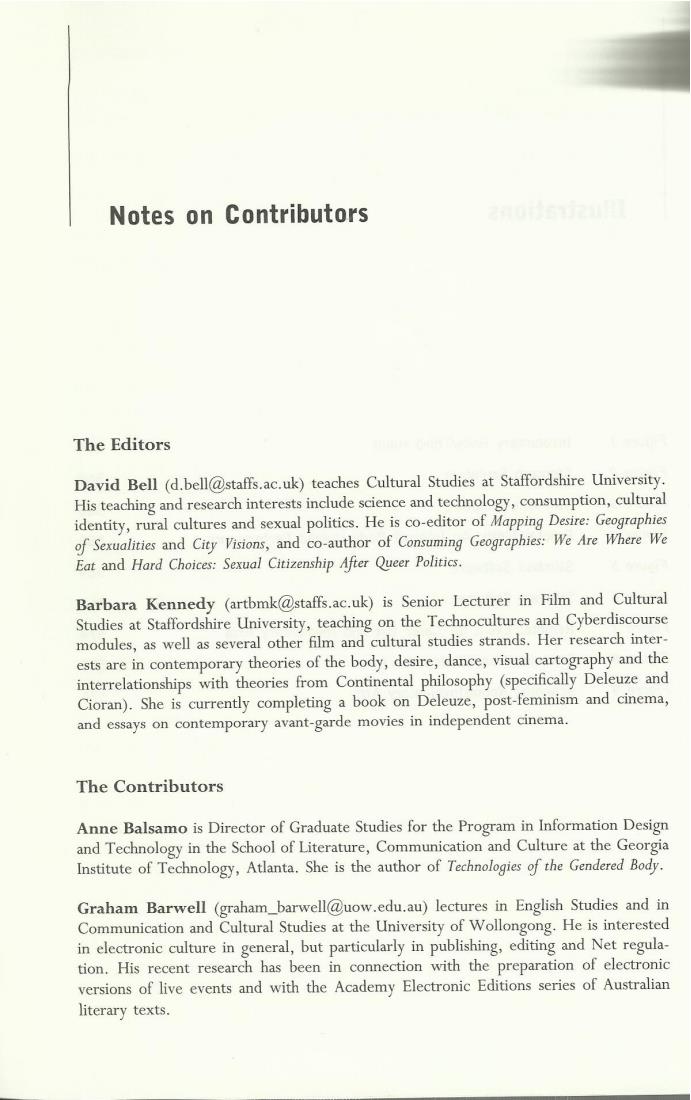
Notes on Contributors The Editors David Bell (d.bell@staffs.ac.uk)teaches Cultural Studies at Staffordshire University. His teaching and research interests include science and technology,consumption,cultural identity,rural cultures and sexual politics.He is co-editor of Mapping Desire:Geographies of Sexualities and City Visions,and co-author of Consuming Geographies:We Are Where We Eat and Hard Choices:Sexual Citizenship After Queer Politics. Barbara Kennedy (artbmk@staffs.ac.uk)is Senior Lecturer in Film and Cultural Studies at Staffordshire University,teaching on the Technocultures and Cyberdiscourse modules,as well as several other film and cultural studies strands.Her research inter- ests are in contemporary theories of the body,desire,dance,visual cartography and the interrelationships with theories from Continental philosophy (specifically Deleuze and Cioran).She is currently completing a book on Deleuze,post-feminism and cinema, and essays on contemporary avant-garde movies in independent cinema. The Contributors Anne Balsamo is Director of Graduate Studies for the Program in Information Design and Technology in the School of Literature,Communication and Culture at the Georgia Institute of Technology,Atlanta.She is the author of Technologies of the Gendered Body. Graham Barwell (graham_barwell@uow.edu.au)lectures in English Studies and in Communication and Cultural Studies at the University of Wollongong.He is interested in electronic culture in general,but particularly in publishing,editing and Net regula- tion.His recent research has been in connection with the preparation of electronic versions of live events and with the Academy Electronic Editions series of Australian literary texts
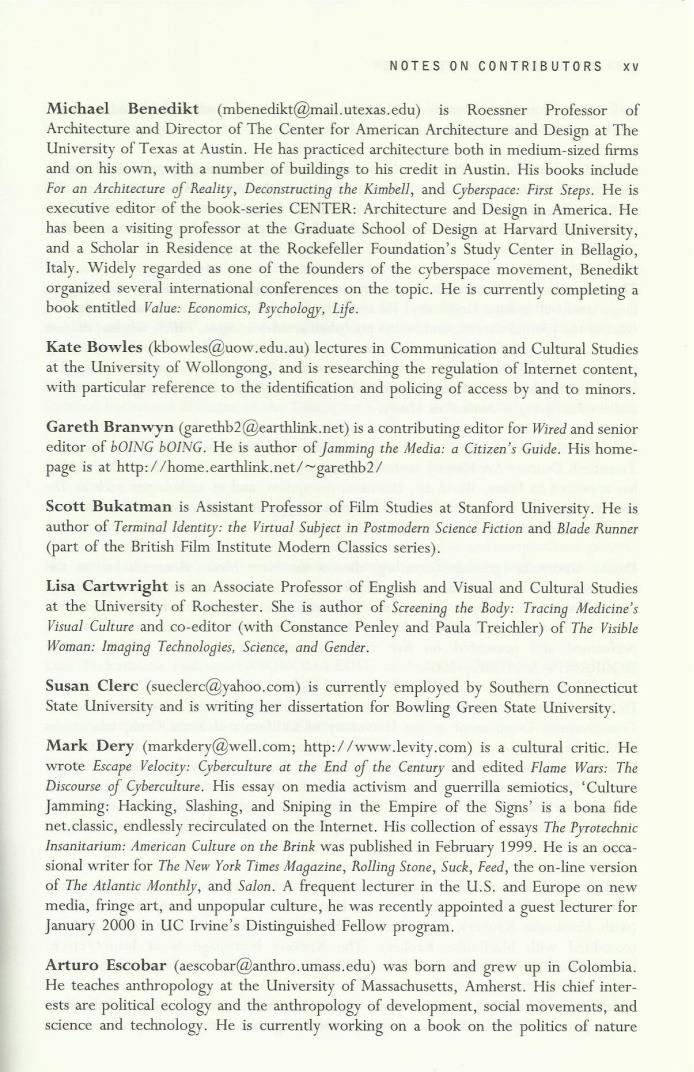
NOTES ON CONTRIBUTORS XV Michael Benedikt (mbenedikt@mail.utexas.edu)is Roessner Professor of Architecture and Director of The Center for American Architecture and Design at The University of Texas at Austin.He has practiced architecture both in medium-sized firms and on his own,with a number of buildings to his credit in Austin.His books include For an Architecture of Reality,Deconstructing the Kimbell,and Cyberspace:First Steps.He is executive editor of the book-series CENTER:Architecture and Design in America.He has been a visiting professor at the Graduate School of Design at Harvard University, and a Scholar in Residence at the Rockefeller Foundation's Study Center in Bellagio, Italy.Widely regarded as one of the founders of the cyberspace movement,Benedikt organized several international conferences on the topic.He is currently completing a book entitled Value:Economics,Psychology,Life. Kate Bowles (kbowles @uow.edu.au)lectures in Communication and Cultural Studies at the University of Wollongong,and is researching the regulation of Internet content, with particular reference to the identification and policing of access by and to minors. Gareth Branwyn(garethb2@earthlink.net)is a contributing editor for Wired and senior editor of bOING bOING.He is author of Jamming the Media:a Citizen's Guide.His home- page is at http://home.earthlink.net/~garethb2/ Scott Bukatman is Assistant Professor of Film Studies at Stanford University.He is author of Terminal Identity:the Virtual Subject in Postmodern Science Fiction and Blade Runner (part of the British Film Institute Modern Classics series). Lisa Cartwright is an Associate Professor of English and Visual and Cultural Studies at the University of Rochester.She is author of Screening the Body:Tracing Medicine's Visual Culture and co-editor(with Constance Penley and Paula Treichler)of The Visible Woman:Imaging Technologies,Science,and Gender. Susan Clerc (sueclerc@yahoo.com)is currently employed by Southern Connecticut State University and is writing her dissertation for Bowling Green State University. Mark Dery (markdery@well.com;http://www.levity.com)is a cultural critic.He wrote Escape Velocity:Cyberculture at the End of the Century and edited Flame Wars:The Discourse of Cyberculture.His essay on media activism and guerrilla semiotics,'Culture Jamming:Hacking,Slashing,and Sniping in the Empire of the Signs'is a bona fide net.classic,endlessly recirculated on the Internet.His collection of essays The Pyrotechnic Insanitarium:American Culture on the Brink was published in February 1999.He is an occa- sional writer for The New York Times Magazine,Rolling Stone,Suck,Feed,the on-line version of The Atlantic Monthly,and Salon.A frequent lecturer in the U.S.and Europe on new media,fringe art,and unpopular culture,he was recently appointed a guest lecturer for January 2000 in UC Irvine's Distinguished Fellow program. Arturo Escobar (aescobar@anthro.umass.edu)was born and grew up in Colombia. He teaches anthropology at the University of Massachusetts,Amherst.His chief inter- ests are political ecology and the anthropology of development,social movements,and science and technology.He is currently working on a book on the politics of nature
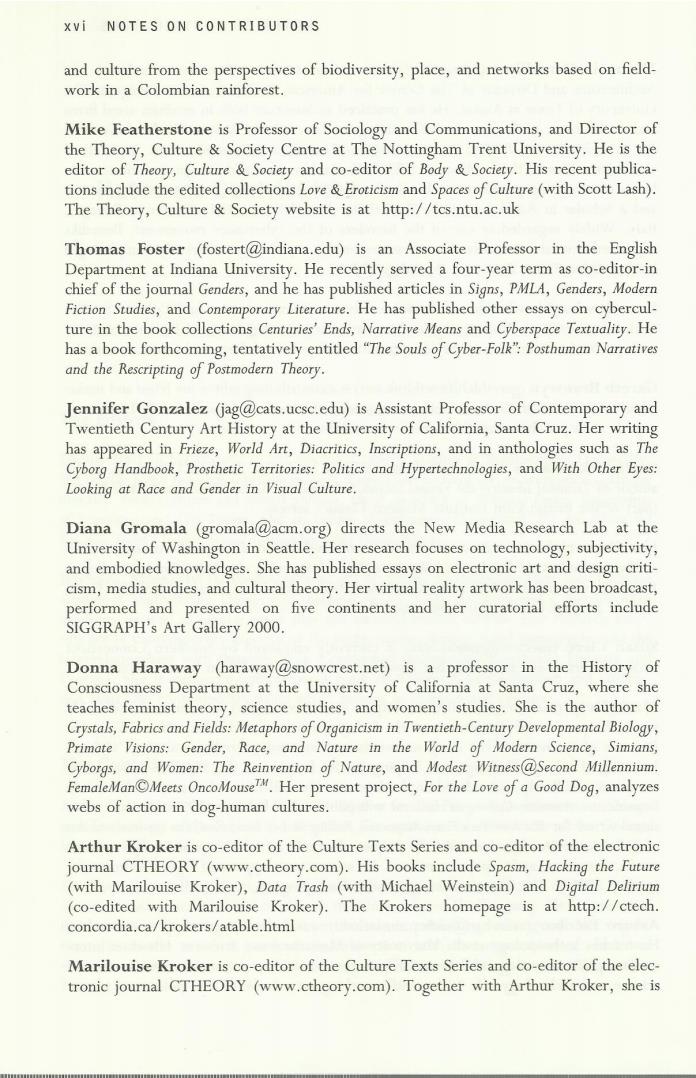
xvi NOTES ON CONTRIBUTORS and culture from the perspectives of biodiversity,place,and networks based on field- work in a Colombian rainforest. Mike Featherstone is Professor of Sociology and Communications,and Director of the Theory,Culture Society Centre at The Nottingham Trent University.He is the editor of Theory,Culture Society and co-editor of Body Society.His recent publica- tions include the edited collections Love &Eroticism and Spaces of Culture (with Scott Lash). The Theory,Culture Society website is at http://tcs.ntu.ac.uk Thomas Foster (fostert @indiana.edu)is an Associate Professor in the English Department at Indiana University.He recently served a four-year term as co-editor-in chief of the journal Genders,and he has published articles in Signs,PMLA,Genders,Modern Fiction Studies,and Contemporary Literature.He has published other essays on cybercul- ture in the book collections Centuries'Ends,Narrative Means and Cyberspace Textuality.He has a book forthcoming,tentatively entitled"The Souls of Cyber-Folk"Posthuman Narratives and the Rescripting of Postmodern Theory. Jennifer Gonzalez(jag@cats.ucsc.edu)is Assistant Professor of Contemporary and Twentieth Century Art History at the University of California,Santa Cruz.Her writing has appeared in Frieze,World Art,Diacritics,Inscriptions,and in anthologies such as The Cyborg Handbook,Prosthetic Territories:Politics and Hypertechnologies,and With Other Eyes: Looking at Race and Gender in Visual Culture. Diana Gromala (gromala@acm.org)directs the New Media Research Lab at the University of Washington in Seattle.Her research focuses on technology,subjectivity, and embodied knowledges.She has published essays on electronic art and design criti- cism,media studies,and cultural theory.Her virtual reality artwork has been broadcast, performed and presented on five continents and her curatorial efforts include SIGGRAPH's Art Gallery 2000. Donna Haraway (haraway @snowcrest.net)is a professor in the History of Consciousness Department at the University of California at Santa Cruz,where she teaches feminist theory,science studies,and women's studies.She is the author of Crystals,Fabrics and Fields:Metaphors of Organicism in Twentieth-Century Developmental Biology, Primate Visions:Gender,Race,and Nature in the World of Modern Science,Simians, Cyborgs,and Women:The Reinvention of Nature,and Modest Witness @Second Millennium. FemaleManMeets OncoMouseTM.Her present project,For the Love ofa Good Dog,analyzes webs of action in dog-human cultures. Arthur Kroker is co-editor of the Culture Texts Series and co-editor of the electronic journal CTHEORY (www.ctheory.com).His books include Spasm,Hacking the Future (with Marilouise Kroker),Data Trash (with Michael Weinstein)and Digital Delirium (co-edited with Marilouise Kroker).The Krokers homepage is at http://ctech. concordia.ca/krokers/atable.html Marilouise Kroker is co-editor of the Culture Texts Series and co-editor of the elec- tronic journal CTHEORY (www.ctheory.com).Together with Arthur Kroker,she is
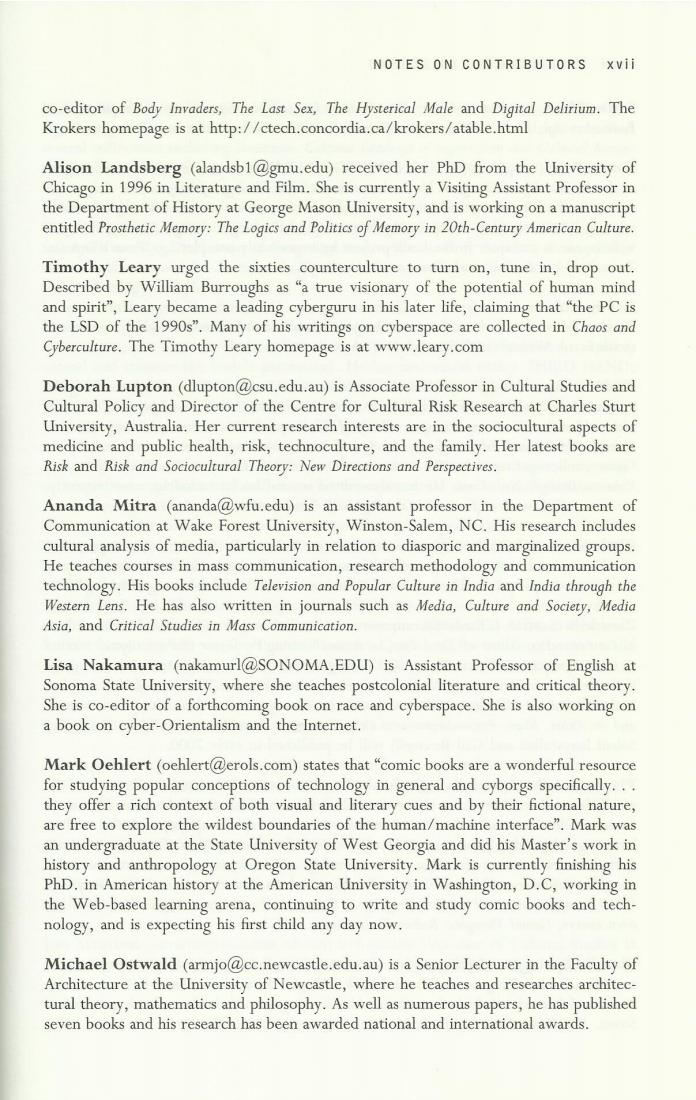
NOTES ON CONTRIBUTORS xVii co-editor of Body Invaders,The Last Sex,The Hysterical Male and Digital Delirium.The Krokers homepage is at http://ctech.concordia.ca/krokers/atable.html Alison Landsberg (alandsb1@gmu.edu)received her PhD from the University of Chicago in 1996 in Literature and Film.She is currently a Visiting Assistant Professor in the Department of History at George Mason University,and is working on a manuscript entitled Prosthetic Memory:The Logics and Politics of Memory in 20th-Century American Culture. Timothy Leary urged the sixties counterculture to turn on,tune in,drop out. Described by William Burroughs as "a true visionary of the potential of human mind and spirit",Leary became a leading cyberguru in his later life,claiming that "the PC is the LSD of the 1990s".Many of his writings on cyberspace are collected in Chaos and Cyberculture.The Timothy Leary homepage is at www.leary.com Deborah Lupton(dlupton@csu.edu.au)is Associate Professor in Cultural Studies and Cultural Policy and Director of the Centre for Cultural Risk Research at Charles Sturt University,Australia.Her current research interests are in the sociocultural aspects of medicine and public health,risk,technoculture,and the family.Her latest books are Risk and Risk and Sociocultural Theory:New Directions and Perspectives. Ananda Mitra (ananda@wfu.edu)is an assistant professor in the Department of Communication at Wake Forest University,Winston-Salem,NC.His research includes cultural analysis of media,particularly in relation to diasporic and marginalized groups. He teaches courses in mass communication,research methodology and communication technology.His books include Television and Popular Culture in India and India through the Western Lens.He has also written in journals such as Media,Culture and Society,Media Asia,and Critical Studies in Mass Communication. Lisa Nakamura (nakamurl@SONOMA.EDU)is Assistant Professor of English at Sonoma State University,where she teaches postcolonial literature and critical theory. She is co-editor of a forthcoming book on race and cyberspace.She is also working on a book on cyber-Orientalism and the Internet. Mark Oehlert (oehlert @erols.com)states that "comic books are a wonderful resource for studying popular conceptions of technology in general and cyborgs specifically... they offer a rich context of both visual and literary cues and by their fictional nature, are free to explore the wildest boundaries of the human/machine interface".Mark was an undergraduate at the State University of West Georgia and did his Master's work in history and anthropology at Oregon State University.Mark is currently finishing his PhD.in American history at the American University in Washington,D.C,working in the Web-based learning arena,continuing to write and study comic books and tech- nology,and is expecting his first child any day now. Michael Ostwald(armjo@cc.newcastle.edu.au)is a Senior Lecturer in the Faculty of Architecture at the University of Newcastle,where he teaches and researches architec- tural theory,mathematics and philosophy.As well as numerous papers,he has published seven books and his research has been awarded national and international awards